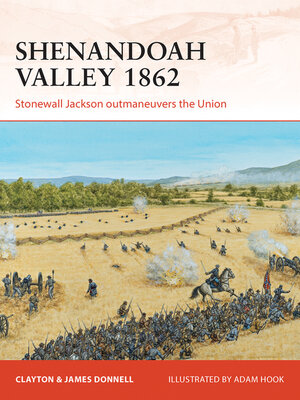Shenandoah Valley 1862
ebook ∣ Stonewall Jackson outmaneuvers the Union · Campaign
By Clayton Donnell

Sign up to save your library
With an OverDrive account, you can save your favorite libraries for at-a-glance information about availability. Find out more about OverDrive accounts.
Find this title in Libby, the library reading app by OverDrive.



Search for a digital library with this title
Title found at these libraries:
| Library Name | Distance |
|---|---|
| Loading... |
A detailed account of the Shenandoah Valley campaign of 1862, which saw Confederate forces under "Stonewall" Jackson overwhelm a series of superior Union forces in a 48-day campaign.
Major General "Stonewall" Jackson became a legend for his actions in Shenandoah Valley, Virginia, in 1862. Marching over 600 miles in 48 days, he, along with his army, won five major battles. His forces, never numbering more than 17,000 men, overcame a combined Union force of 50,000, demonstrating his ability to maneuvre his troops and deceive his enemies into believing he possessed the advantage. Charted throughout these pages is the journey leading up to, and including, "Stonewall" Jackson's final victory, all the while performing better than anyone could have expected.
As Clayton and James Donnell show, the campaign became a showcase for the mobility and success of Jackson's outnumbered men, who held the larger Union forces pinned down and off balance, consequently allowing Jackson to force march his men to take part in the Seven Days Battles that saved Richmond and gained him victory.
Major General "Stonewall" Jackson became a legend for his actions in Shenandoah Valley, Virginia, in 1862. Marching over 600 miles in 48 days, he, along with his army, won five major battles. His forces, never numbering more than 17,000 men, overcame a combined Union force of 50,000, demonstrating his ability to maneuvre his troops and deceive his enemies into believing he possessed the advantage. Charted throughout these pages is the journey leading up to, and including, "Stonewall" Jackson's final victory, all the while performing better than anyone could have expected.
As Clayton and James Donnell show, the campaign became a showcase for the mobility and success of Jackson's outnumbered men, who held the larger Union forces pinned down and off balance, consequently allowing Jackson to force march his men to take part in the Seven Days Battles that saved Richmond and gained him victory.







